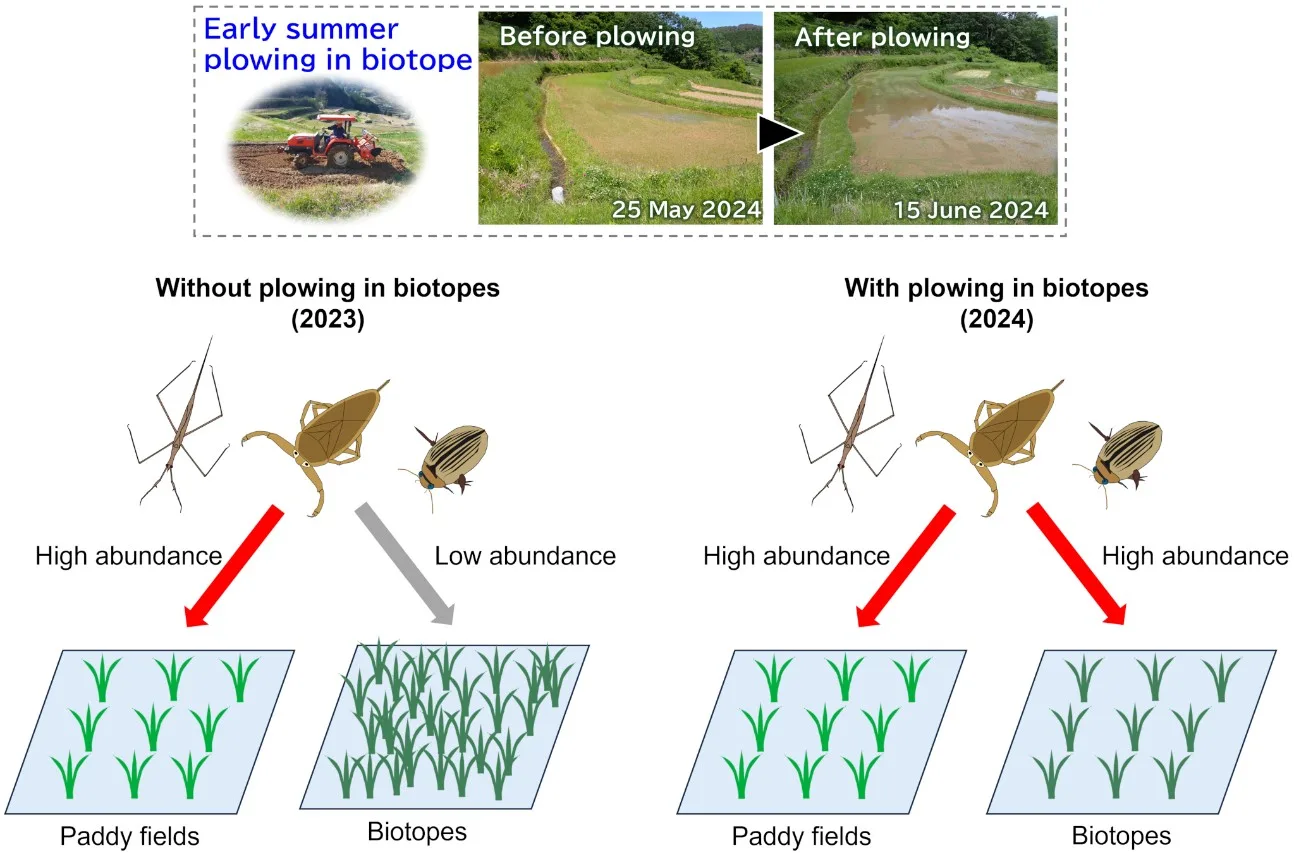

Effects of early summer plowing on aquatic insects in fallow field biotopes
A research team including Associate Professor Shin-ya Ohba and doctoral student Taichi Fukuoka of Nagasaki University, Assistant Professor Reiya Watanabe of Kurashiki University of Science and the Arts (doctoral student at the University of Hyogo), who served as the lead author of the study, Sho Kubo of Wesco Inc., Shinji Takahashi of the Technical Division of Tohoku University, and Professor Shiro Sagawa of the University of Hyogo conducted field experiments. The team found that plowing in early summer to create open water surfaces in fallow-field biotopes helps increase the number of aquatic insects, including the endangered giant water bug, Kirkaldyia deyrolli (Fig. 1).
Since the 1980s, Japan has seen a steady increase in abandoned paddy fields due to factors such as declining crop revenues and the aging of the farming population. When paddy fields are abandoned and vegetation cover increases, the land becomes terrestrial, making it difficult to restore them as rice paddies. This change also reduces the availability of wetland habitats for aquatic insects such as the endangered giant water bug (Kirkaldyia deyrolli) and diving beetles. In addition, abandoned paddy fields often become habitats for nuisance wildlife, including deer and wild boars that damage crops, and are associated with an increased risk of landslides compared to cultivated paddy fields.
To address the problem of abandoned paddy fields, fallow field biotopes (abandoned fields maintained as water-filled habitats) have been recognized as a potential solution, highlighting the need to develop effective management methods that contribute to biodiversity conservation. Since biotopes are primarily managed to conserve biodiversity, agrochemicals such as herbicides are generally avoided. As a result, aquatic weeds tend to grow more densely in these habitats than in cultivated paddy fields.
Our previous research found that in biotopes, paddy fields, and ponds, aquatic insect species richness tends to decline in habitats with higher vegetation cover ratios (the proportion of the water surface covered by aquatic weeds) during early summer, the initial breeding season for aquatic insects (Watanabe et al. 2024). Flying aquatic insects find water bodies by detecting horizontally polarized light reflections from the water surface. Based on this, we hypothesized that plowing biotopes in early summer to suppress excessive aquatic weed growth and create open water surfaces would increase the number of aquatic insects arriving, and we conducted field experiments to test this hypothesis.

Fig. 1. Early summer plowing in biotopes creates open water surfaces, which increases the abundance of aquatic insects such as the giant water bug, Kirkaldyia deyrolli.
Fallow field biotopes are expected to compensate for wetland habitats in paddy environments. However, the optimal timing of plowing to support aquatic insect diversity (Odonata, Hemiptera, and Coleoptera) remains unclear. We conducted field experiments to investigate whether early summer plowing in biotopes suppresses vegetation cover and promotes aerial colonization by aquatic insects. We managed 10 abandoned paddy fields as two types: paddy fields and biotopes. The biotopes were not plowed in the early summer of 2023, but both the biotopes and paddy fields were plowed in 2024. We evaluated the indirect effects of vegetation cover differences between the biotopes and paddy fields on the abundance of each aquatic insect species yearly. In 2023, we confirmed that dense vegetation covers suppressed colonization, reducing the abundance of aquatic insects in biotopes than in paddy fields, including the endangered giant water bug, Kirkaldyia deyrolli, which reproduces in early summer. In 2024, early summer plowing resulted in no notable differences in vegetation cover between the biotopes and paddy fields, thereby nullifying the indirect negative effects of vegetation cover. Early summer is the optimal timing for plowing, as reducing vegetation cover at this time could promote the colonization of species that reproduce in early summer.
Keywords: Agricultural management; Conservation; Disturbance; Rice field abandonment
Journal: Hydrobiologia
Title: Effects of early summer plowing on aquatic insects in fallow field biotopes
Authors:
Reiya Watanabe
Department of Environmental Life Science, College of Life Science, Kurashiki University of Science and the Arts
Graduate School of Regional Resource Management, University of Hyogo
Sho Kubo
Wesco Inc.
Taichi Fukuoka
Graduate School of Integrated Science and Technology, Nagasaki University
Shinji Takahashi
Technical Division, Tohoku University
Kazukiyo Kobayashi
Hyogo, Japan
Shiro Sagawa
Graduate School of Regional Resource Management, University of Hyogo
Shin-ya Ohba
Graduate School of Integrated Science and Technology, Nagasaki University
Biological Laboratory, Faculty of Education, Nagasaki University
Corresponding Author:
Reiya Watanabe (https://orcid.org/0000-0002-3098-9206)
DOI: https://link.springer.com/article/10.1007/s10750-025-05949-4
Publication Date: August 14, 2025
For more details, please see the full article published in Hydrobiologia.